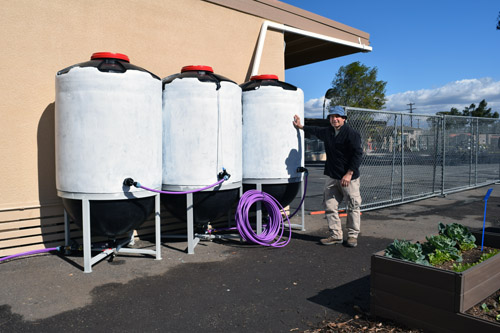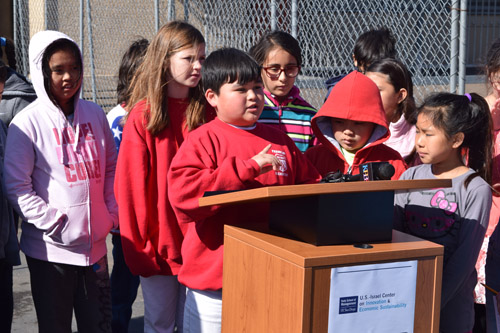
By Donald H. Harrison


SAN DIEGO — Fifth graders at the Benjamin Franklin STEAM Magnet Elementary School on Monday, Feb. 1, helped to explain to the news media how a low-tech Israeli invention will help their school conserve rainwater, and may prove to be an important tool in California’s fight against periodic droughts.
STEAM is an acronym for Science, Technology, Engineering, Art and Mathematics, and Benjamin Franklin Elementary–named for the 18th century American statesman and inventor who did some playing in rain himself — caters to students who are interested in developing their skills in these areas. The U.S. Israel Center on Innovation and Economic Sustainability at UCSD’s Rady School of Management helped arrange for Franklin Elementary to become one of three pilot sites in San Diego County for a rain barrel system that separates water from sediment and other debris, thereby clarifying the water sufficiently to be pumped to toilets for flushing.
Rainwater-using toilets could be a possibility in the future of Franklin Elementary School and Pacific Beach Middle School, but for the time being at least, the roof runoff water will be used to irrigate vegetable gardens maintained by students on the campuses. At the Encinitas School District Farm Laboratory, which is the third pilot school in San Diego County, indoor plumbing has been configured to permit the rainwater to be used for toilet flushing, according to Susan Lapidus, executive director of the U.S. Israel Center.
“We have been learning about water and water conservation for the last month or two,” commented Ben Kleinpastor, a 5th grader. “It’s really important to conserve water because we are in a drought currently. We want to conserve water so we don’t run out of water.”
His classmate Scott Impham added: “I think the rain barrels are a really good thing for our school … Like in the slide show that (Israeli inventor Amir Yechieli) showed us, there was really dirty water, so he created this rain barrel which helps our school and helps us conserve.”
Besides involving the students with problem-solving water technology, the three large rain barrels installed at the school in San Diego’s City Heights neighborhood will serve as canvases for water conservation-oriented student art projects.

Ethan Le, another fifth grader in the class taught by faculty member Rick Froehbrodt, explained that the students intend to paint on one a waterfall, on another a pond where animals come to drink, and on the third a scene evoking the time and effort people in some developing nations must expend just to fetch water.
Yechieli, an Israeli inventor who has installed his rainwater system in more than 150 Israeli schools, said that whereas rain barrels have been in use for centuries, the problem always has been that they collect sediment and debris and eventually become unusable. He said that instead of a flat bottom, the barrels or tanks that he has developed have a “very efficient” round bottom.
“The round bottom tank with an outlet at the bottom proved to be a very efficient way to remove all the sediments that accumulate in the tank,” he said. “The tank never, never gets dirty. After two or three days when you flush out the dirt, the column of water in the tank is totally clean and suitable for indoor (toilet) use.”
He added: “you can refill the tanks as many times as rain comes during the winter.”
Yechieli said that at Israeli schools, and probably at American schools as well, 90 percent of the water usage is for flushing toilets, and only 10 percent for handwashing or drinking water or other uses. If systems are used in which rainwater is cleaned to government-required levels for flushing, a tremendous amount of water can be saved. For the 150 Israeli schools now using the system, he said, this “amounts to millions of cubic meters per year.”
Don Whisman, the principal of Franklin Elementary (who occasionally dresses up as Benjamin Franklin to dramatize a lesson), said the mission of his school is to teach its students “critical thinking, problem solving and how to solve real-life situations. And we try to use ‘design thinking’ in our learning here. Amir has modeled for them how to use design thinking to solve a problem we have here in California and they have in Israel.”
Whisman added that the pilot project “aligns well with the Next Generation Science Standards which our school district is one of the first in the state to implement. … A lot of the fifth grade standards have to do with water conservation and human impact.”
Froehbrodt commented that the students in his class have been “focused in on the understanding of the effects of pollution on our watershed, and the effects of water scarcity around the world.” The rainwater project enables his students to “see first hand how we can collect water, how we can conserve and reuse the water that is available to us, and give them a tangible project…”
Whisman noted that UCSD graduate students “helped develop curriculum to go with the rain barrels which Mr.Froehbrodt will use in class. We are doing surveys pre and post to see how their (the fifth graders’) attitudes change. We’re also doing surveys at control schools to see how our kids compare to those in schools that don’t have a rain barrel system.”
Yechieli told San Diego Jewish World that roof runoff systems for an average size school cost approximately $10,000 U.S. to build and install.
*
Harrison is editor of San Diego Jewish World. He may be contacted via donald.harrison@sdjewishworld.com. Comments intended for publication in the space below must be accompanied by the letter writer’s first and last name and by his/ her city and state of residence (city and country for those outside the U.S.)
Pingback: This Weeks Sanity Report from Israel - Feb 21 2016
Pingback: Gute Nachrichten aus Israel — Woche bis 21.02.2016 | abseits vom mainstream - heplev